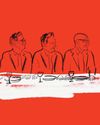
The question before the room was how much blood the banker should bleed. Mickey Down and Konrad Kay sat in an editing bay in Cardiff, Wales, scrutinizing footage from the third season of Industry, their HBO drama about the drug-addled, oversexed employees of a multinational financial firm. They'd paused on one particular shot of a character realizing that his nose had sprung a leak after much snorting of powders. The blood had been added digitally, and it fired down straight and steady from the character's nostril, like a burgundy laser beam.
The 35-year-old Down, wearing a Nike zip-up vest and thick tortoiseshell glasses, stroked his chin. The blood was looking a little too gruesome. "We just want it to be noticeable; it's a geyser at the moment," he said. A producer noted his feedback, and another unpaused the footage. The next shot revealed that the banker had been cradling a newborn baby in his arms and that the blood had splattered onto the infant's cheek.
The image, and the writers' matter-of-factness in discussing it, caused me to gasp. Down gave an apologetic chuckle. "We're sort of numb to it, aren't we?" he said. The 36-year-old Kay-the quieter and wryer of the two men-murmured, "It doesn't register." It referred to the depravity of Industry, a study of lethal greed and ambition transmitted from one generation to the next. When the series debuted in 2020, it followed a class of new hires at the London offices of Pierpoint, a fictional competitor to the likes of J. P. Morgan and Goldman Sachs. Young and diverse in race, sexuality, and class, the protagonists entered a century-old institution at which "culture change"-an attempt to build a kinder, more ethical workplacewas supposedly afoot. Rather than upending the system, however, the new hires proved quick studies at old-fashioned self-dealing and backstabbing.
This story is from the {{IssueName}} edition of {{MagazineName}}.
Start your 7-day Magzter GOLD free trial to access thousands of curated premium stories, and 9,000+ magazines and newspapers.
Already a subscriber ? Sign In
This story is from the {{IssueName}} edition of {{MagazineName}}.
Start your 7-day Magzter GOLD free trial to access thousands of curated premium stories, and 9,000+ magazines and newspapers.
Already a subscriber? Sign In

A Brief History of Yuval Noah Harari - How the scholar became Silicon Valley's favorite guru
"About 14 billion years ago, matter, energy, time and space came into being." So begins Sapiens: A Brief History of Humankind (2011), by the Israeli historian Yuval Noah Harari, and so began one of the 21st century's most astonishing academic careers. Sapiens has sold more than 25 million copies in various languages. Since then, Harari has published several other books, which have also sold millions. He now employs some 15 people to organize his affairs and promote his ideas.

Boat Fish Don't Count
The wild, obsessive, dangerous pursuit of Montauk's biggest striped bass

The Anti-Rock Star
Leonard Cohen's battle against shameless male egoism

Rachel Kushner's Surprising Swerve
She and her narrators have always relied on swagger-but not this time.

Men on Trips Eating Food
Why TV is full of late-career Hollywood guys at restaurants

You Think You're So Heterodox
Joe Rogan has turned Austin into a haven for manosphere influencers, just-asking-questions tech bros, and other \"free thinkers\" who happen to all think alike.

What Abortion Bans Do to Doctors
In Idaho and other states, draconian laws are forcing physicians to ignore their training and put patients' lives at risk.

THE LOYALIST KASH PATEL WILL DO EXACTLY WHAT TRUMP WANTS.
A 40-year-old lawyer with little government experience, he joined the administration in 2019 and rose rapidly. Each new title set off new alarms.

THE RADICAL CONVERSION OF MIKE LEE
IN 2016, HE TRIED TO STOP TRUMP FROM BECOMING PRESIDENT. BY 2020, HE WAS TRYING TO HELP TRUMP OVERTURN THE ELECTION. NOW HE COULD BECOME TRUMP'S ATTORNEY GENERAL.

HYPOCRISY, SPINELESSNESS, AND THE TRIUMPH OF DONALD TRUMP
He said Republican politicians would be easy to break. He was right.